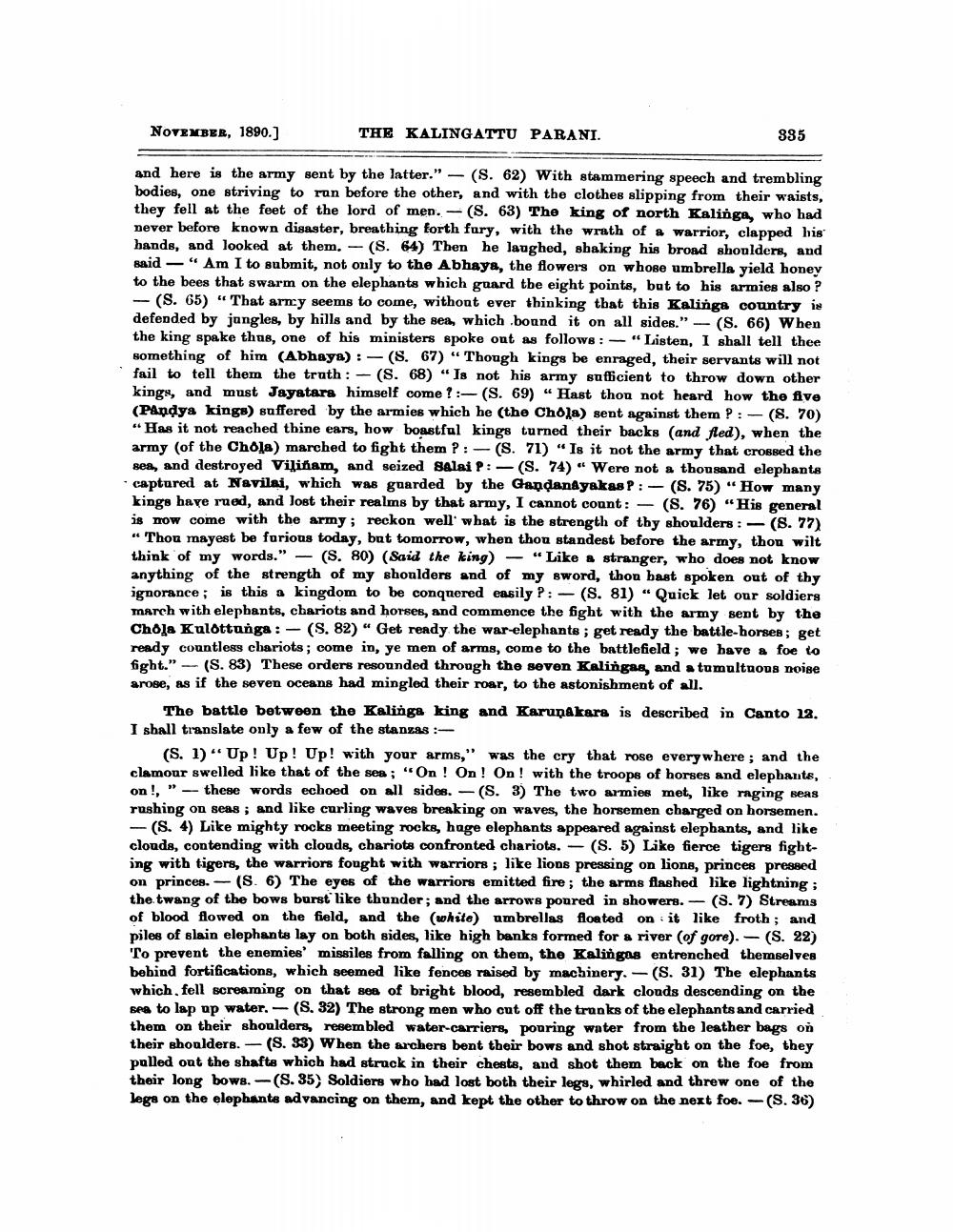________________
NOVEMBER, 1890.)
THE KALINGATTU PARANI.
335
and here is the army sent by the latter." — (S. 62) With stammering speech and trembling bodies, one striving to ran before the other, and with the clothes slipping from their waists, they fell at the feet of the lord of men. - (S. 63) The king of north Kalinga, who had never before known disaster, breathing forth fury, with the wrath of a warrior, clapped his hands, and looked at them. - (8. 64) Then he laughed, shaking his broad shoulders, and said "Am I to submit, not only to the Abhaya, the flowers on whole umbrella yield honey to the bees that swarm on the elephants which guard the eight points, but to his armies also ?
- (S. 65) “That army seems to come, without ever thinking that this Kalinga country is defended by jungles, by hills and by the sea, which .bound it on all sides." -(S. 66) When the king spake thus, one of his ministers spoke out as follows:- "Listen, I shall tell thee something of him (Abhaya) : - (8. 67) “ Though kings be enraged, their servants will not fail to tell them the truth :-(S. 68) “Is not his army sufficient to throw down other kings, and must Jayatars himself come! :-(S. 69) “ Hast thon not heard how the five (Pandya kings) suffered by the armies which he (the Chola) sent against them ?:- (8. 70) " Has it not reached thine ears, how boastful kings turned their backs (and fled), when the army (of the Chola) marched to fight them ?:- (S. 71) “Is it not the army that crossed the sea, and destroyed Viļinam, and seized salai P: - (S. 74) "Were not a thousand elephants captured at Navilai, which was guarded by the Gandanayakasp:- (s. 75) “How many kings have rued, and lost their realms by that army, I cannot count: - (S. 76) "His general is now come with the army ; reckon well. what is the strength of thy shoulders :-(8. 77) • Thou mayest be furious today, but tomorrow, when thou standest before the army, thon wilt think of my words." - (S. 80) (Said the king) - "Like & stranger, who does not know anything of the strength of my shoulders and of my sword, thon bast spoken out of thy ignorance ; is this a kingdom to be conquered easily P:-(S. 81) “ Quick let our soldiers march with elephants, chariots and horses, and commence the fight with the army sent by the Chola Kulottunga : - (S. 82) “ Get ready the war-elephants ; get ready the battle-horses; get ready countless chariots; come in, ye men of arms, come to the battlefield; we have a foe to fight." -- (S. 83) These orders resounded through the seven Kalingas, and a tumultuous noise arose, as if the seven oceans had mingled their roar, to the astonishment of all.
The battle between the Kalinga king and Karunakara is described in Canto 12. I shall translate only a few of the stanzas :
(S. 1) "Up! Up! Up! with your arms," was the cry that rose everywhere ; and the clamour swelled like that of the sea ; "On ! On ! On! with the troops of horses and elephants, on!," -- these words echoed on all sides. - (S. 3) The two armies met, like raging seas rushing on seas ; and like curling waves breaking on waves, the horsemen charged on horsemen. -(S. 4) Like mighty rocks meeting rocks, hoge elephants appeared against elephants, and like clouds, contending with clouds, chariots confronted chariots. - (S. 5) Like fierce tigers fighting with tigers, the warriors fought with warriors; like lions pressing on lions, princes pressed on princes. — (S. 6) The eyes of the warriors emitted fire; the arms flashed like lightning : the twang of the bows burst like thunder; and the arrows poured in showers. - (8.7) Streams of blood flowed on the field, and the (white) umbrellas floated on it like froth; and piles of slain elephants lay on both sides, like high banks formed for a river (of gore). - (S. 22) To prevent the enemies' missiles from falling on them, the Kalingas entrenched themselves bebind fortifications, which seemed like fences raised by machinery.- (S. 31) The elephants which, fell screaming on that sea of bright blood, resembled dark clonds descending on the sea to lap op water. -(S. 32) The strong men who cut off the trunks of the elephants and carried them on their shoulders, resembled water-carriers, pouring water from the leather bags on their shoulders. - (8. 33) When the archers bent their bows and shot straight on the foe, they pulled out the shafta which had struck in their chests, and shot them back on the foe from their long bow. -(S. 35) Soldiers who had lost both their legs, whirled and threw one of the legs on the elephants advancing on them, and kept the other to throw on the next foe. -(S. 36)




